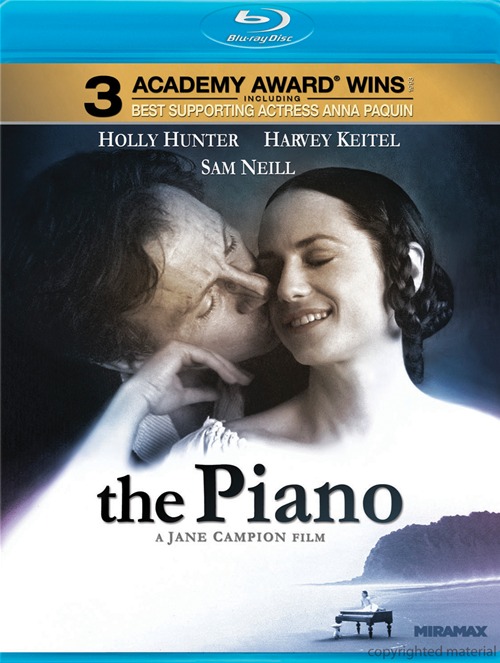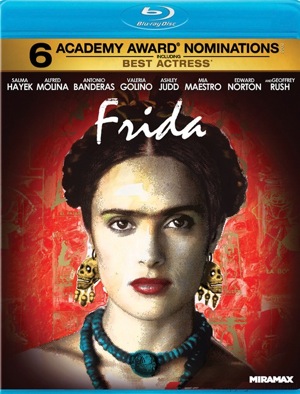CHICAGO – Patrick McDonald of HollywoodChicago.com appears on “The Morning Mess” with Dan Baker on WBGR-FM (Monroe, Wisconsin) on March 21st, 2024, reviewing the new streaming series “Manhunt” – based on the bestseller by James L. Swanson – currently streaming on Apple TV+.
Blu-ray Review: ‘The Piano,’ ‘Frida’ Showcase Unforgettable Female Performances
CHICAGO – Jane Campion and Julie Taymor are two of the most fascinating directors in modern cinema. They are unafraid to take major gambles, and their audacity has occasionally caused their projects to derail. But on a good day, they are capable of achieving artistic transcendence on a grand scale, as evidenced in Campion’s 1993 masterwork, “The Piano,” and Taymor’s 2002 gem, “Frida.”
Both pictures are bold in their depiction of sexuality and adamant in their refusal to portray their central female characters as victims. Though these women are damaged physically and emotionally by tragic occurrences, their lives are triumphant studies in survival against the odds. What’s particularly interesting is the way in which both women are drawn into unlikely romances with men whose less-than-photogenic features are overshadowed by their magnetism and fierce appreciation for beauty.
 Blu-ray Rating: 4.0/5.0 |
The love story that blooms between a mute pianist, Ada (Holly Hunter), and an illiterate plantation worker (Harvey Keitel) begins as a calculated seduction before transforming into a passionate affair. Stuart Dryburgh’s magnificent cinematography highlights the contrasting hues of warm interiors and the chilly, mud-caked wilderness of 1850’s New Zealand. Ada has entered this unwelcome environment because of an arranged marriage to a self-absorbed landowner (Sam Neil). She’s accompanied by a young daughter, played by 11-year-old Anna Paquin in what is surely one of the finest and most complex child performances ever captured on film. Since Paquin is used as Hunter’s mouthpiece, she has the majority of the film’s dialogue, and delivers a monologue comprised of extravagant lies in order to garner sympathy for her mother. This is one of the few moments in which Campion utilizes blatant surrealism by cutting to an animated representation of Paquin’s imagined tale. Yet there are more subtle and lyrical examples of dream-like visions in several shots, including the final one. Like “Frida,” “The Piano” finds peace in the finality of death, as well as exhilaration in the resilience of life. But whereas Taymor tends toward visual excess, Campion benefits from the restraint of her metaphorical imagery, such as when three pairs of footprints in the sand gradually unite on a shared path.

The Piano was released on Blu-ray on Jan. 31, 2012.
Photo credit: Lionsgate Entertainment
While “Frida” isn’t quite in the same league as “The Piano,” it’s a vibrant and alluring tribute to legendary artist Frida Kahlo that strips away the feminist clichés that clouded her extraordinary career in the ’80s. Salma Hayek delivers the performance of her career in the title role, effortlessly embodying the artist from her teenage years through her adult life marked by agonizing pain. One of Taymor’s most galvanizing set-pieces is the bus accident that resulted in much of Kahlo’s subsequent health problems. The sequence occurs in slow motion as the bus floor breaks apart like the snapping of a spine. Taymor is the perfect filmmaker to explore Kahlo’s trouble canvases, since fine art has always played a major role in her films. She highlights the key moments in Kahlo’s life that led to some of her most arresting masterpieces. Elliot Goldenthal’s score is as rich and exuberant as the heroine herself, and Alfred Molina brings great charm to the role of Diego Rivera, Kahlo’s longtime lover whose unsatiable sexual appetite occasionally caused the couple to drift apart. There’s a marvelous collage of still images and archival footage that details Frida and Diego’s time in New York City, as well as a playful and poignant homage to “King Kong.” What anchors the entire production is Hayek’s luminous work, and in an extended interview on the Blu-ray, the actress reveals the ultimate compliment that she received from her harshest critic. When Kahlo’s niece saw the film, she felt as if she had truly shared her beloved aunt’s company for two hours, and was so happy that the picture hadn’t made her a stereotypical victim. In a way, one of Kahlo’s lines in the film succinctly summarizes the message of both “The Piano” and “Frida.” “At the end of the day,” she surmises, “we can endure much more than we think we can.”
 Frida was released on Blu-ray on Jan. 31, 2012. Photo credit: Lionsgate Entertainment |
“The Piano” and “Frida” are both presented in 1080p High Definition (with a 1.78:1 aspect ratio), accompanied by English and Spanish subtitles, and unfortunately include no new special features. Aside from its theatrical trailer, “The Piano” has no extras at all. I would’ve loved to have seen a cast retrospective, or at the very least, footage from the Academy Award ceremony where Campion, Hunter and Paquin all received prizes. Paquin’s stunned reaction and brief yet eloquent acceptance speech remains one of the most priceless Oscar moments, and an interview with her would’ve been ideal, since the actress’s presence in the film seems to be its primary selling point (a sticker on the front of the packaging aims to draw in “True Blood” fans).
The extras on the “Frida” Blu-ray are all recycled from its 2003 DVD release, but what extras they are. Taymor is an artist who doesn’t feel the need to keep her intentions a secret from her audience, and her candid analysis of each sequence on the audio commentary track is utterly fascinating. She notes that Hayden Herrera’s book, “Frida: A Biography of Frida Kahlo,” served as the film’s chief source material, and praises the Mexican government for allowing the crew to shoot in as many of the real locations as possible. A mini-featuette offers a tour of several locations, such as Kahlo’s family home, the “Blue House,” which now stands as a museum (the artifacts on display may inspire some art buffs to purchase an immediate ticket to Mexico City). Taymor says she wanted the female voice to be predominant throughout the film, and she made the excellent decision to cast Mexican singer-songwriter Lila Downs, whose haunting vocals eerily reflect Frida’s psyche at various points in the picture. Another key singer featured in the final cut is Chavela Vargas, who offers her own fierce interpretation of the song, “La Llorona.” Goldenthal interviews Vargas at length, and there’s a memorable moment when the singer reflects on her brief affair with Kahlo. “Her joined eyebrows were like a swallow in full flight,” she says.
Perhaps the most excellent interview with Taymor is conducted by Bill Moyers, who highlights various sequences in the film, such as an unforgettable forced perspective shot that makes it seem as if a painting had come to life. The director explains in a 30-minute AFI Q&A that she had no interest in making a biopic or a portrait of an artist. What made Kahlo’s work inherently cinematic was its autobiographical nature. The fact she spent fifty percent of her life gazing at her reflection in the mirror above her canvas bed made it easy for Taymor to understand why Kahlo mainly drew self-portraits. Among the plethora of other extras is a conversation with the Brothers Quay (who designed the stop-motion animation for Frida’s post-accident nightmare), and a recording session where Hayek sings the stirring, “La Bruja.” Goldenthal instinctively chose the number before discovering that it was one of Rivera’s favorite numbers—further proof that the spirit of Kahlo was guiding this project the entire time.
 | By MATT FAGERHOLM |


